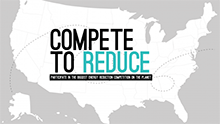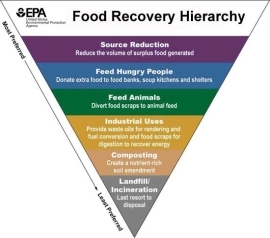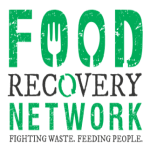- Home
- Who We Are
- Campus Sustainability
Green Initiatives & Eco-Friendly Practices
Sustainability is a long-term responsibility to meet the needs of the present without compromising the needs of future generations. The environment has a limit and it must be respected and embraced. At St. John's, our Sustainability Coordinators work together to promote a more sustainable campus.
Climate Action Plan

St. John’s is on the path with a roadmap to achieve 50 percent carbon emissions reduction from energy consumed by buildings by year 2030. Within the new NYC Climate Mobilization Act of 2019 there are tiered emissions compliance targets for 2024 and 2030. Being below the emissions limits for 2024, St. John’s is developing plans to meet its 2030 emissions limit and includes renewable energy sources such as geothermal and solar power.
St. John’s Energy Master Plan 2017 can be viewed here.
Sustainability Tracking, Assessment, & Rating System™ (STARS)

STARS, developed by the Association for the Advancement of Sustainability in Higher Education, is a transparent, self-reporting framework for colleges and universities to measure their sustainability performance. STARS ratings last three years. As a Charter Participant in STARS, St. John's achieved a Silver rating in 2011 and upgraded to a Gold rating in 2012 and 2016.
Categories of the STARS 2.0 Technical Manual
Academics
| Engagement
|
Student Involvement
The Office of Sustainability partners with Residence Life to engage students in their dorms to live more sustainably through recycling enhancements and energy conservation. Events include an Energy Reduction Tournament “Conserve to Serve,” Move-out Food and Clothing Collection, Earth Week, Train the Trainer program with Resident Assistants, Campus Sustainability Day, Battle of Buildings for Spirit, RecycleMania, Campaigns for Awareness and Involvement, and Green-Handed Raffles.
Municipal Solid Waste & Recycling


St. John's participates in RecycleMania, a spring semester, eight-week, nationwide tournament involving more than 400 schools. The University reached a diversion rate of 50 percent for RecycleMania 2017 and achieved the RecycleMania’s national title in the Food Waste Reduction category for the Campus Engagement Case Study Competition.
At St. John's, recycling and food waste reduction efforts are ongoing, and include implementation of single stream recycling, enhancements to hardware (bins and signage), staff retraining, and food waste recovery. Help change a culture of waste by making recycling and waste reduction a top priority.

Student Sustainability Coordinators
Since 2008, St. John's has maintained a team of student workers as Sustainability Coordinators. These students perform a variety of tasks, from policing campus-wide recycling of municipal solid waste to running campaigns for student involvement in energy conservation. These workers perform daily collection of food waste to generate on-site composting, as well as maintain the organic garden and run numerous special events.
EPA’s Food Recovery Challenge (FRC) Program

St. John's is a charter participant in the US Environmental Protection Agency’s FRC program, which has three primary actions: food waste prevention; food recovery for donation; and food waste composting.

Food Waste Compost System
Annually, St. John's composts on-site over 100 tons of food waste (95% of all campus food waste). The Office of Sustainability with student workers built and operate an aerated static pile (ASP) three-bin composting system. Source separation is done by Chartwells Dining Service, then, food waste (1,000 pounds per day) is processed through a pulper machine. Each week, the pulped food waste is mixed with wood chips and loaded into one of three ASP composting bins. After three weeks in the ASP followed by 12 weeks in winnow, the compost can then screened/finished and applied to the campus grounds.

Food Recovery
St. John's is a registered Chapter in Food Recovery Network and with the help of Chartwells Dining Service, annually recovers over 6,000 pounds of good prepared food for donation to help alleviate hunger.
Tree Campus USA Program
St. John's received Tree Campus USA participation awards for the past s seven years by meeting the program criteria of tree care committee; tree care plan; finding the tree care program; incorporation of Academic Service-Learning (ASL); and Annual Arbor Day observance / event. The Queens campus has over 3,000 trees, 500 of which came from the NYC Million Trees project (2008–11). With faculty over site, in 2013 students planted a northeast native species campus arboretum around the softball field. Each year, the University's Campus Tree Mapping Project grows with the help of students guided by dedicated faculty member Paula Lazrus. Currently there are more than 1,000 trees mapped. You can view the progress of the University's Tree Mapping Project at https://sju.maps.arcgis.com/apps/MapJournal/index.html?appid=e93c6f15a2b24969bf5ab32fa20d2955.
Student Community Garden
The student community garden is an organic vegetable garden built and maintained by student workers and the Student Earth Club. The garden consists of more than 50 semi-raised planting beds with organic soils, automatic irrigation, and central drainage system. Students harvest and deliver the vegetables to help support St. John’s Bread & Life soup kitchen in Brooklyn, NY. Over 1,000 pounds of vegetables are harvested annually.
On-Site Food Waste Compost System
St. John's began composting food waste in 2009. In 2011, through the Office of Sustainability, student workers built a large-scale aerated static pile (ASP) three-bin composting facility. Each day during academic semesters, student workers pick up about 1,000 pounds of preconsumer and postconsumer food waste from five campus kitchens and process it through a pulper machine. Each week, the pulped food waste is mixed with wood chips and loaded into one of three ASP (6-cubic yard) bins. After three weeks in the ASP followed by 10 weeks in winnow, the compost is then screened/finished and applied to the campus grounds. Annually, St. John's recovers about 42 tons of food waste and paper napkins for composting and mixes it with 12 tons of wood chips.
Compost Tea Brewing and Application
Compost made on-site is also used in compost tea brewing. After brewing the tea, organic solutions and minerals are added and the tea is applied /sprayed to the soils in campus tree and shrub beds. The University conducts compost tea brewing workshops in the spring and fall. These workshops presents a cocurricular opportunity for students and faculty to learn about composting, soil biology, and the soil food web.
Outreach & Marketing
The University engages and strives to partner with numerous organizations. Some of these are; NYC Carbon Challenge; NYS Association of Reduce, Reuse and Recycle; EPA; The Arbor Day Foundation; Association For the Advancement of Sustainability in Higher Education (AASHE); Con Edison and; NYSDEC. On-campus, The Sustainability Office most often communicates with Residence Life, Student Earth Club, Learning Communities, Academic Service Learning, Student Wellness, Campus Ministry, and Human Resources.
Comments are welcome; e-mail [email protected].
For more information on sustainability initiatives on campus, send us an email or call the Sustainability Department at 718-990-5054.
